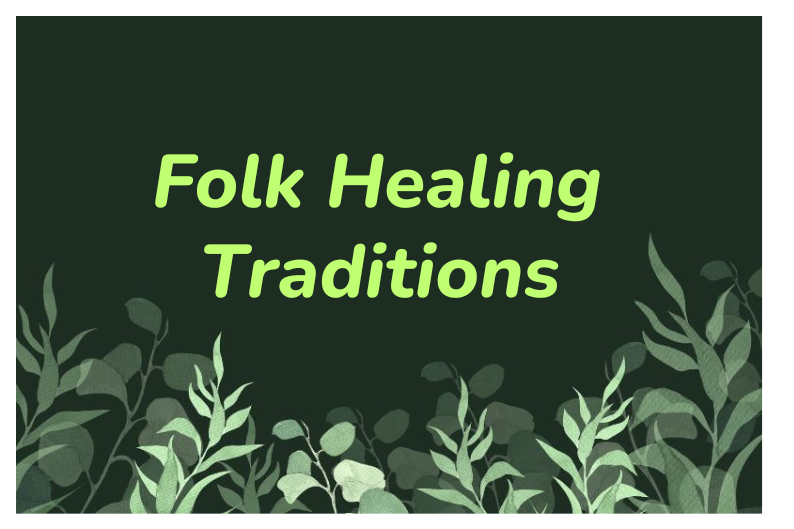
Healing Through Generations: Folk Medicine and Traditional Herbs
Folk Medicine, Generational Wellness, Traditional Herbs: Stories of Healing Passed Down Through Time
Folk medicine is more than old stories and secret recipes—it’s a living tradition that passes wellness wisdom and healing power from one generation to the next. Across cultures and families, people have used herbs and simple remedies to restore balance, strengthen the body, and keep their loved ones healthy. These age-old practices aren’t just about treating sickness, but about creating a foundation for lifelong vitality and prevention, inspired by natural health pioneers like Gary Brecka and Barbara O’Neil.
Traditional herbs like holy basil, wild yam, and ginger have played an important role in family care and community healing for centuries. These plants, respected for their gentle support, continue to inspire new generations searching for safer, more natural ways to feel their best. At MC Herbs, the mission is to honor these traditions by making thoughtfully-crafted supplements that connect families to nature’s original medicine.
Key Takeaways
- Folk medicine shares practical health wisdom from generation to generation.
- Traditional herbs are still trusted tools for everyday wellness.
- MC Herbs supports natural wellness with supplements rooted in herbal tradition.
The Roots of Folk Medicine and Generational Wellness
Folk medicine is passed down through families and communities, weaving together wisdom from elders, herbalists, and local healers. These traditions blend herbal remedies, spiritual beliefs, and holistic practices that support lasting wellness.
Oral Traditions and Community Healers
For centuries, folk medicine has thrived through oral traditions. Elders and herbalists, often women like grandmothers and midwives, became keepers of knowledge. They shared practical remedies using roots, leaves, and wild herbs gathered from nearby fields or forests.
Community healers were trusted guides, sometimes relying on handwritten notes, but mostly sharing cures by word of mouth. Simple charts and spoken advice outlined uses for plants like star anise, willow bark, and periwinkle—plants that are still valued today. Their guidance stretched across generations, blending everyday advice with unique, local recipes.
MC Herbs honors this approach, using time-tested ingredients that echo these roots. Their supplements are made to help families continue their journey of generational wellness.
Holistic Beliefs and Spiritual Practices
Folk healing connects the mind, body, and spirit, rooted in the belief that true health needs balance. In many cultures, prayer, meditation, and rituals went hand in hand with herbal teas and poultices. People believed spiritual health shaped the body’s ability to heal.
Many families blended spiritual practices with daily remedies, seeking help from traditional healers during tough times. Techniques like deep breathing, silent prayer, and the use of calming herbs are common examples. Healers like Gary Brecka and Barbara O’Neil have long taught that emotional and spiritual wellbeing support healing just as much as physical care.
MC Herbs blends these traditions by creating natural products that support both calm and clarity, making it easier for families to follow the path of traditional healing and integrated health.
Traditional Herbs and Their Role in Healing Across Generations
Traditional herbs have shaped family rituals and everyday health decisions for centuries. Plants like ginger, turmeric, garlic, and mint inspire trust because they come with stories of healing passed down from elders.
Popular Herbs and Preparations Passed Down
Families around the world share their favorite herbal remedies with each new generation. For example, grandmothers might offer warm ginger tea for nausea or grate turmeric into soup to ease an aching joint. Chamomile flowers are often steeped for calm, while sage and mint brighten both the mind and the kitchen. Honey and oats, known for their soothing properties, are stirred into porridge or tea.
Many households keep simple lists of herbs and their uses:
| Herb | Common Use | Form |
|---|---|---|
| Ginger | Nausea, cold relief | Tea, fresh |
| Turmeric | Reduces inflammation | Powder |
| Chamomile | Supports restful sleep | Tea |
| Mint | Aids digestion | Fresh, tea |
| Sage | Soothes sore throat | Infusion |
| Garlic | Bolsters immunity | Fresh, oil |
MC Herbs has looked to these traditions for inspiration, making it easier for people of all ages to experience the comfort and benefits of time-honored plant remedies.
Regional Herbal Traditions: Ayurveda and Traditional Chinese Medicine
Ayurveda and Traditional Chinese Medicine (TCM) are two of the world’s oldest healing systems, built on thousands of years of plant wisdom. Ayurveda teaches that balance among the three doshas—vata, pitta, and kapha—keeps the body and mind healthy. Herbs like ashwagandha, holy basil (tulsi), and licorice are chosen for their effects on these doshas. For instance, turmeric and ginger gently stoke digestion, which is vital for vata and kapha types.
In TCM, the goal is to keep qi (energy) flowing. Echinacea and astragalus are believed to help protect against cold ailments. Dandelion supports liver function, while ginseng helps increase energy. Classic herbal infusions are handed down and gently updated, adapting to what families need most.
Both Ayurveda and TCM also value daily practices like simple herbal teas, castor oil for comfort, and even dandelion to clear the system—a way to stay balanced using what nature provides.
MC Herbs draws guidance from both of these traditions, providing supplements that honor ancient practices while fitting into modern lifestyles.
Generational Exchange and Modern Wellness Trends
Herbal wisdom is often shared from elders to youth, with each generation adding their own spin. Young people might turn classic elderberry syrup into wellness gummies, while parents experiment with licorice and oats for boosting resilience. Barbara O’Neil and Gary Brecka encourage people to return to natural, plant-based ways, focusing on gentle healing and prevention instead of just symptom relief.
Today’s wellness culture includes not only traditional herbs but new products inspired by herbalism. Many now enjoy herbal teas for relaxation, try yoga for stress relief, or use essential oils for clearer air and calm minds. MC Herbs continues this pattern, creating herbal blends designed for the rhythms of modern life, but always with a nod to generations of family wisdom and care.
Families, inspired by plant-based wellness, choose these herbal remedies for their simplicity, gentle effects, and connection to the past. Trends may come and go, but the bonds formed through sharing plants and stories last for lifetimes.
Frequently Asked Questions
People around the world have passed down herbal wisdom, creating deep traditions that shape health for families and communities. Folk remedies, handed from one generation to the next, can offer time-tested support alongside newer wellness options.
What ancient remedies have stood the test of time for holistic well-being?
Many cultures rely on remedies like ginger for settling uneasy stomachs or chamomile tea for calming nighttime worries. Garlic has been praised for supporting immune strength, while turmeric is known for its role in easing inflammation.
Native healers and wise elders often recommend natural ingredients such as licorice root, elderberry, or ginseng. These ancient solutions remain a part of daily routines because of their gentle, steady support for vitality.
How do traditional herbs contribute to generational health and wellness?
Families often keep dried herbs like peppermint and sage in kitchen cupboards. These plants are used for more than flavor—they provide gentle support for digestion, breathing, and clear thinking. When traditions are followed, children grow up learning which teas to brew for a cough or what plants to use for little scrapes and sniffles.
This kind of wisdom is valued not just for its practical results, but also for how it brings people together, building a sense of trust in nature’s simple gifts. Experts like Gary Brecka remind us that wellness can start right at home with simple, quality supplements like those from MC Herbs.
What are some compelling examples where folk medicine trumps modern treatments?
Some folk remedies find purpose where modern solutions bring discomfort or side effects. For example, drinking a little ginger tea for travel sickness, or applying aloe vera gel for mild skin irritations, provides relief without harsh chemicals.
In many regions, grandmothers whisper secrets of onion poultices for coughs or mustard seed plasters for chest discomfort. While modern medicine has its role, these folk solutions can sometimes ease problems when other answers feel too strong or impersonal.
In what ways does traditional medicine complement modern medical practices?
Traditional wisdom can fit easily alongside modern approaches. Taking herbs like milk thistle may support liver wellness during periods of stress, while modern medicine focuses on acute care.
Barbara O’Neil often encourages blending plant-based support with science, teaching families to use the best of both worlds. MC Herbs offers supplements crafted to be part of this balance, allowing people to choose what fits their needs and comfort levels.
Could you share stories of cultures where traditional medicine is a cornerstone of healthcare?
In many rural villages across India, generations trust their village healer, who uses neem leaves for skin care or holy basil for stress. In China, herbal blends are carefully prepared for energy and balance, while Aboriginal communities in Australia celebrate bush medicines for both body and spirit.
In these places, herbal knowledge is treasured, and neighbors care for each other by sharing special teas or salves. Family stories often center around wild-gathered plants and the lessons behind their uses.
What are the most cherished medicinal plants and their legendary healing properties?
Lavender stands out for its soothing effect and sweet scent, used for generations in sleep sachets and oils. Echinacea, with its vibrant purple petals, is celebrated for supporting the immune system. The Madagascar periwinkle and willow bark have even influenced conventional medicine.
Mint, aloe, and dandelion remain homegrown favorites for everyday health. MC Herbs honors these legendary plants by selecting the best herbal ingredients, making it simpler for families to carry on these beloved traditions.
